Trees living in conditions where the carbon dioxide (CO2) has been artificially elevated are likely to become more efficient in conserving water.
According to new findings, published by University of Birmingham researchers, the trees under increased CO2 treatment were able to increase their water use efficiency by increasing their carbon uptake whilst, simultaneously, conserving water by adjusting the opening and closing of pores on the leaves, called stomata.
In a study published in New Phytologist, the researchers found that, contrary to previous assumptions, these responses were similar across all the tree types studied.
The results offer fresh approaches to modelling and predicting plant behaviour under increased CO2 conditions. It offers a new piece of the puzzle for plant scientists working to build a more complete picture of how our forests will respond to atmospheric conditions expected to be the norm by 2050.
The trade off – important to plants across the globe – is between carbon gain and water loss. This compromise exists as a result of the plant’s structure: stomata open and close to allow plant to take in CO2 for growth, but as the stomata are open, water is able to leave the plant via transpiration. That means the plant must compromise between absorbing the maximum amount of CO2, while also minimising water loss.
The researchers analysed data on long-term elevated CO2 experiments in trees over the past 20 years. The analysis spanned 16 different sites worldwide and included data from experiments looking at whole trees to smaller branch and leaf data collection.
Taking all the data into account, the researchers found the efficiency of water use in the trees’ leaves increased by 85% for a doubling of CO2, which is the CO2 increase expected by mid-century compared to the pre-industrial average.
The team then used this data to calculate the ‘g1 number’, which expresses the water cost of carbon gain for each tree type. They found the g1 number did not change under elevated CO2, making it a very useful tool to describe tree-leaf responses in circumstances beyond those measured directly.
“The models we use to predict the responses of trees to future atmospheric CO2 levels still contain lots of uncertainties – and the behaviour of stomata is one of these,” explained Dr Anna Gardner, of the Birmingham Institute of Forest Research, who led the study.
“In elevated CO2 we might expect water consumption to reduce because stomata are taking in CO2 at a higher concentration so do not have to be open as long. But actually, we found the increased CO2 also caused an increase in photosynthesis – and this behaviour was a stronger driver to increase water use efficiency. In effect, under higher CO2, the trees are getting more carbon gain for each ‘buck’ of water spent.”
“One reason trees are so important to ecosystems is because they store carbon – but water is also a valuable resource, so we need to find ways to accurately calculate the carbon cost of that water. All this data helps us build a more accurate picture of the likely behaviour of these resources in the future.”



